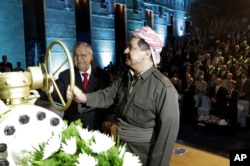Russian energy major Rosneft has agreed to take control of the main oil pipeline in Iraq’s Kurdistan, further boosting its role as the main international investor in the semi-autonomous region.
The move is an apparent part of a broader strategy by President Vladimir Putin to ratchet up Moscow’s political and economic influence in the Middle East. It came amid the crisis in Kurdistan’s relations with the central government in Baghdad, which erupted after the region held an independence referendum last month.
Rosneft said its share in the project may total as much as 60 percent, while the current pipeline operator KAR Group will retain 40 percent.
Sources familiar with the deal said Rosneft’s investment in the project was seen totaling about $1.8 billion.
The deal comes days after Baghdad threatened to reroute a big chunk of oil flows toward an old oil pipeline, which has been out of operation for several years since Kurdistan built its own infrastructure to the Turkish Mediterranean port of Ceyhan.
Rosneft’s influential Chief Executive Officer Igor Sechin said Thursday that Kurdish authorities and Baghdad have to resolve their differences by themselves.
Iraq, along with neighboring Iran and Turkey, has pledged to isolate Kurdistan in the wake of last month’s referendum.
That includes cutting off air and banking ties and reviving an old pipeline to Turkey to deprive Erbil of a big chunk of oil revenues.
Rosneft will be investing in expanding Erbil’s independent pipeline, which Baghdad has targeted, hoping to boost its capacity by a third to 950,000 barrels per day. That is the equivalent of about 1 percent of total global supply.
With Rosneft acquiring 60 percent in the project, the Kremlin oil major effectively becomes a controlling stakeholder in Kurdish oil infrastructure. That should give Erbil some sense of security as it faces unprecedented pressure from its neighbors.
Rosneft has already agreed to invest $400 million in five oil blocks in Iraqi Kurdistan. It also had previously loaned Kurdistan $1.2 billion, guaranteed by oil sales, and is seeking to help Erbil build two major oil and gas pipelines.






